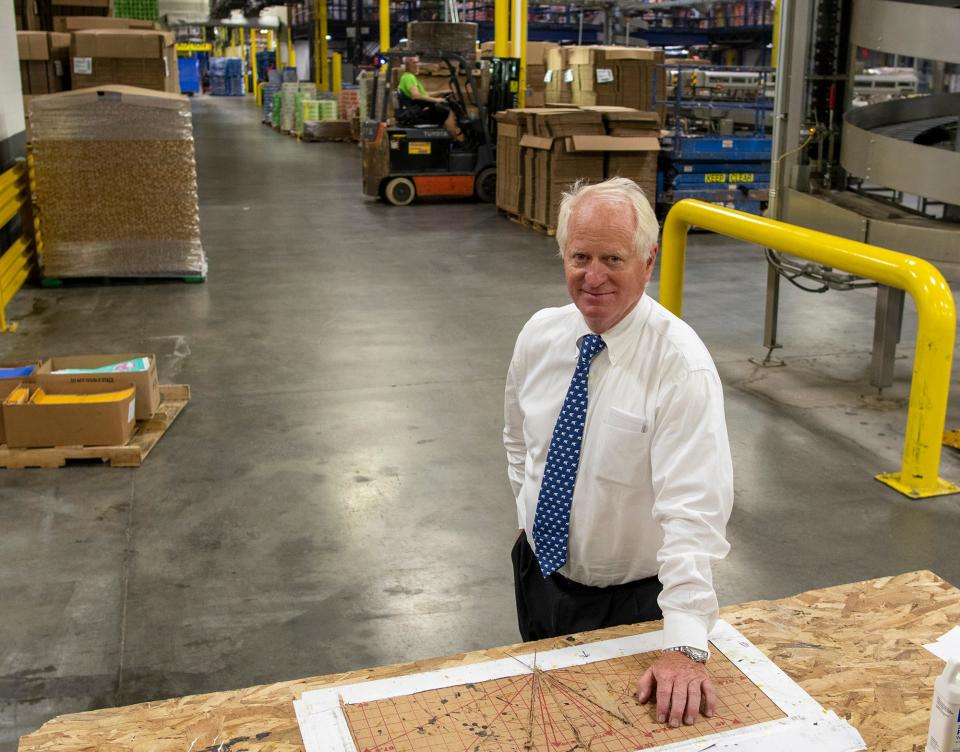What is ESG and what could it mean for your retirement savings?
WORCESTER – Climate change and your retirement savings. Two issues that have nothing in common, right?
Wrong.
As the impacts of global warming become more apparent - whether it’s massive snowstorms that buried Buffalo or the weeks of severe flooding that devastated parts of California - some market watchers expect more workers will want to put their retirements savings in investments that match their values around wanting to do what’s right for the planet.
Three letters, ESG, are central to this topic, and they could play a significant role in how companies in Worcester team up with investment advisers to give employees choices of where to invest their retirement savings.
What do the letters mean?
ESG stands for environmental, social and governance, and a new rule by the U.S. Department of Labor that takes effect Jan. 30 means ESG can be considered by “plan fiduciaries” when deciding where to invest retirement savings. A plan fiduciary is anyone with discretionary authority or control over a retirement plan or its assets, or someone who gives investment advice to the plan or its participants.

Chris Crowley and his brother, Ralph, the fourth generation of the Crowley family to own Polar Beverages in Worcester, are plan fiduciaries.
"If we screw up, we’re going to jail,” said Chris Crowley, a comment made in jest with an equal amount of seriousness, to explain that the brothers are legally on the hook if they’re reckless with their workers' 401(k) retirement funds. Polar employs 600 in the city out of a total workforce of 2,000, and has more than $100 million in employee retirement savings under management.
The company gives employees the option to invest their retirement monies in ESG vehicles, said Chris Crowley. However, many choose “lifestyle funds” that vary in risk tolerance. Younger workers tend to go with the higher-risk funds, while older ones generally pick lower-risk options that follow the rule of thumb that a conservative approach generally means a comfortable nest egg for the golden years.
As for how much of the company's more than $100 million in retirement savings is invested in ESG, Chris Crowley and Polar Vice President of Human Resources Stephen Carey didn’t have the figure. Each stressed that the goal is to protect retirement savings.
“We want to be responsible,” said Chris Crowley. “Our goal is to be responsible managing (our employee retirement) funds. If they do ESG, it’s their choice.”
Biden behind new rule
The impetus to give fiduciaries the option to consider – not require - ESG when making investment decisions stems from an executive order signed by President Joe Biden in 2021. It instructed the federal government to look at policies to protect workers and families against the threats of climate-related financial risks.
Before the new rule was established, fiduciaries were required to only consider financial performance when making investment decisions on behalf of beneficiaries. If they went beyond that parameter, they could be held legally and financially liable.
The prior rule was established in 2020 during the Trump administration, said Michael P. Angelini, a lawyer at Bowditch & Dewey and former director and chairman at The Hanover Insurance Group, the largest public company headquartered in Worcester County.

“From my perspective... this (new rule) is good public policy and good financial policy,” said Angelini.
Harry Kokkinis, the third-generation owner of Table Talk Pies, agreed.

“This is a positive development in terms of dealing with climate change,” said Kokkinis, whose Worcester company offers a 401(k) retirement plan to its 300 workers.
At Saint-Gobain, formerly Norton Co., ESG is one of the investment choices for its 1,000 employees in Worcester.
"At Saint-Gobain North America, all 401(k) eligible employees have the freedom to choose where they invest their retirement savings, including mutual funds that prioritize environmental, societal and governance topics," reads a company statement.
Hanover Insurance Group, with more than 4,000 employees, declined to comment for this story. So did Imperial Distributors, a Worcester company that employs 400 in Massachusetts and works with suppliers of nonfood items that stock supermarket shelves, like beauty and wellness items.
The City of Worcester also declined to comment. It employs nearly 2,000, not including those who work in the public schools.
In a prepared statement, UMass Memorial Health, the largest employer in Central Massachusetts with more than 17,000 staffers, said the new ESG rule is something the health care system will evaluate.
“We are evaluating all the recent regulatory developments related to retirement plans,” reads a statement from Brian J. Huggins, senior vice president of finance and corporate controller. “We consider a number of factors when selecting investments to be included in our benefit plans for our amazing caregivers and these changes will give us another data point to consider.”
ESG backlash
Not everyone supports ESG.
BlackRock, the world's biggest asset manager, reportedly lost $4 billion after critics – including several Republican-led states - blasted company leader Larry Fink for directing BlackRock funds into ESG investments.
Educating the public about ESG benefits and investment risks is a key to combating the backlash, said Steven Rothstein, who works at Ceres, a Boston nonprofit that encourages capital markets to make a commitment to sustainable practices.
One necessity is a need for a clearer definition of what ESG means.
“There is some green washing going on, saying it’s a climate fund and it’s not. We need to clarify the rules of that, and the SEC (U.S. Securities and Exchange Commission) is working on that,” said Rothstein.
Strong performance
Some fiduciaries may be stuck in thinking that ESG is too risky a place to invest retirement savings. But Rothstein pointed out that ESG performance is strong.
“Overall, climate-oriented funds over the last 10 years have done very well, at or better than the market,” he said. “It’s no longer a case where you have to give up returns to invest in some of these funds. Over the long term, these funds have outperformed their peers.”
ESG potential growth
PricewaterhouseCoopers, one of the “Big Four” accounting firms, reported in October an expected sharp increase in ESG investing.
Some of the report's conclusions:
● ESG-related assets under management worldwide will climb from $18 trillion in 2021 to $33 trillion in 2026
● ESG assets will represent 21% of global assets under management in five years
● ESG-oriented assets under management will more than double in the U.S. from $4.5 trillion in 2021 to $10.5 trillion in 2026
In addition, 60% of institutional investors said ESG delivered higher performance yields, compared to non-ESG equivalent options.
Rothstein offered his own numbers – the Labor Department’s new rule effects nearly $7 trillion of assets; 60 million to 70 million people work for companies that manage these assets; and more than 90% of companies don’t offer ESG options.
“We encourage every company to consider (ESG),” said Rothstein. “I expect it will take some time.”
One hope of Rothstein’s is that besides companies offering ESG investment choices, they’ll also make it a so-called “default option.”
Default in this case means companies make investment choices when their employees don't. When that occurs, the company generally picks from a handful of options, and Rothstein would like one of those choices designated ESG.
Final perspective
Circling back to his $7 trillion figure, Rothstein said if just 10% of companies moved their retirement funds into ESG vehicles, the result would be hundreds of billions of dollars for the clean energy transition that the world is going through.
As long as ESG gets a fair shake, in terms of accurate information for the public to consider, Rothstein believes ESG has a bright future, especially given the billions, if not trillions, in economic losses caused by climate change disruptions.
“The arc of history over the next months and years, we are confident more companies will offer these funds for employees,” Rothstein said.
Contact Henry Schwan at henry.schwan@telegram.com. Follow him on Twitter @henrytelegram
This article originally appeared on Telegram & Gazette: U.S. Department of Labor makes ESG an investment choice to consider.

